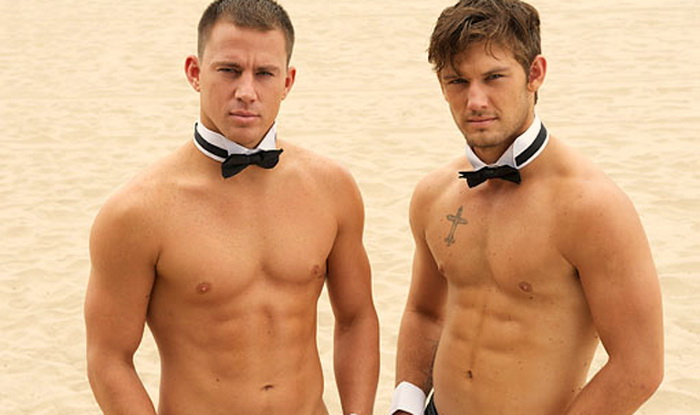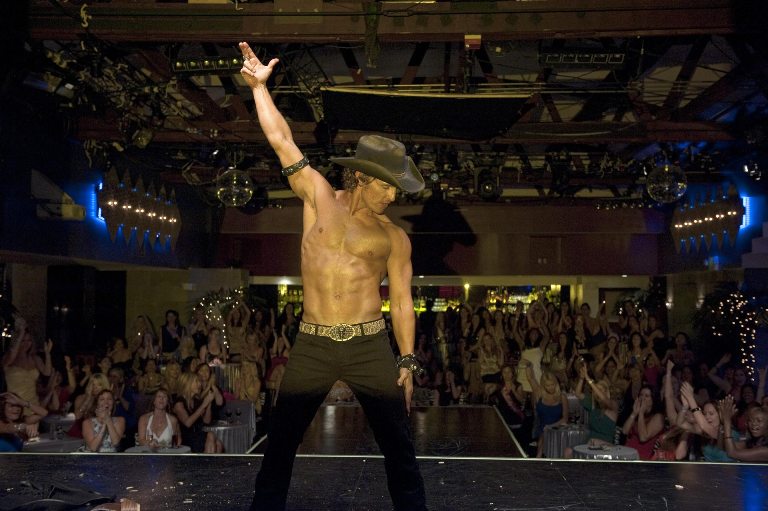Having spent the last few years alternating deftly between high-profile, star-studded blockbusters (the Ocean’s trilogy, last year’s Contagion) and smaller, more niche projects starring largely unknowns (Bubble, The Girlfriend Experience), Steven Soderbergh may have found his perfect middle ground. Male stripping dramedy Magic Mike pairs big names (Channing Tatum, Matthew McConaughey) with near-unknowns; it combines trashy visual pleasures with shrewd, straightforward character writing; it was made on a $7 million shoestring, and has already become a box office hit in the US. It is something of a contradiction, and all the more fascinating for it.
Tatum plays the eponymous Mike, a veteran stripper who unfailingly draws in adoring female crowds in Xquisite, a Tampa club owned by McConaughey’s smoothly seedy Dallas. During his day job as a construction worker he meets Adam (Alex Pettyfer), a lifelong slacker in need of a job he can stick with, and ends up taking the kid under his impressively muscular wing. But as Adam becomes increasingly seduced by the stripping profession and the perks it has to offer, Mike begins to question his own participation in it.
Tatum’s range as a performer beyond the visual is still somewhat limited, but he’s so inherently endearing that Mike’s early midlife-crisis plight – while hardly original – is evoked in a way that’s both sympathetic and unexpectedly universal. The same can’t be said for his co-star Pettyfer (pictured above with Tatum), who suffers from a much more damning lack of range with none of the mitigating charisma. His journey admittedly functions largely as a catalyst for Mike’s and never really develops into a fully-formed character arc, but Pettyfer still misses several opportunities to imbue Adam with any depth. This is a young actor who’s been attracting a lot of buzz of late for no discernable reason at all, aside from a presumably shrewd managerial team, and while it’s entirely possible that he’s capable of turning in a performance to justify it, his dead-eyed, emotionally barren turn here is far from it. McConaughey (pictured above), by contrast, proves yet again just how endlessly magnetic he’s capable of being once he resigns himself to also being a little bit creepy. He’s the star of two sequences that bookend the film, and embodies its mixed tone of sleaze with razor-sharp character observation. Dallas is a man who knows exactly the profession he’s in and exactly what it says about him while simultaneously being utterly deluded by it, whereas Mike is increasingly unable to buy into the same self-perpetuated mythology. Magic Mike is less strip than strip search, its aesthetic thrills giving way to a probing and deceptively simple study of characters wresting with their limitations.
McConaughey (pictured above), by contrast, proves yet again just how endlessly magnetic he’s capable of being once he resigns himself to also being a little bit creepy. He’s the star of two sequences that bookend the film, and embodies its mixed tone of sleaze with razor-sharp character observation. Dallas is a man who knows exactly the profession he’s in and exactly what it says about him while simultaneously being utterly deluded by it, whereas Mike is increasingly unable to buy into the same self-perpetuated mythology. Magic Mike is less strip than strip search, its aesthetic thrills giving way to a probing and deceptively simple study of characters wresting with their limitations.
Overleaf: watch the trailer to Magic Mike









